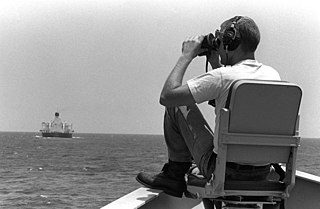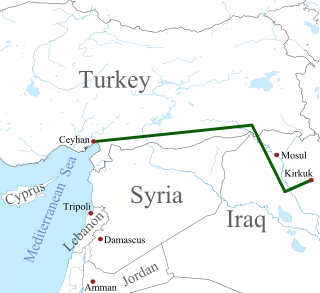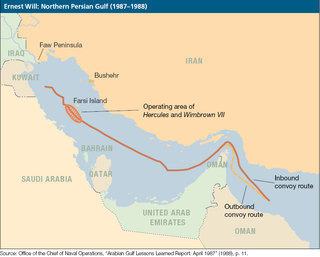
The Iran–Iraq War was a protracted armed conflict that began on 22 September 1980 when Iran was invaded by neighbouring Iraq. The war lasted almost eight years, ending in a stalemate on 20 August 1988 when Iran accepted a UN-brokered ceasefire. Iraq's rationale for the invasion was primarily to cripple Iran and prevent Ayatollah Ruhollah Khomeini from exporting the 1979 Iranian Revolution movement to Shia-majority Iraq and threaten the Sunni-dominated Ba'athist leadership. Iraq had also wished to replace Iran as the dominant state in the Persian Gulf, which had not been previously possible due to pre-revolutionary Iran's goliath status in both economic and military terms as well as its close alliances with the United States and Israel. The war followed a long-running history of border disputes, as a result of which Iraq had planned to annex Iran's oil-rich Khuzestan Province and the east bank of the Shatt al-Arab.
This is a list of aviation-related events from 1984:

Operation Earnest Will was the American military protection of Kuwaiti-owned tankers from Iranian attacks in 1987 and 1988, three years into the Tanker War phase of the Iran–Iraq War. It was the largest naval convoy operation since World War II.

The Anglo-Persian Oil Company (APOC) was a British company founded in 1908 following the discovery of a large oil field in Masjed Soleiman, Iran. The British government purchased 51% of the company in 1914, gaining a controlling number of shares, effectively nationalizing the company. It was the first company to extract petroleum from Iran. In 1935 APOC was renamed the Anglo-Iranian Oil Company (AIOC) when Reza Shah Pahlavi formally asked foreign countries to refer to Persia by its endonym Iran.

Farsi Island is a tiny, barren Iranian island in the Persian Gulf. There is an IRGC Navy base on this island. The island has an area of about 0.25 km2 (0.10 sq mi) and is restricted from the public. The center of Farsi Island is located at latitude 27° 59' 36" N and longitude 50° 10' 22" E. Its maximum elevation is 4 metres (13 ft). The word Farsi means "Persian".

A tanker is a ship designed to transport or store liquids or gases in bulk. Major types of tankship include the oil tanker, the chemical tanker, and gas carrier. Tankers also carry commodities such as vegetable oils, molasses and wine. In the United States Navy and Military Sealift Command, a tanker used to refuel other ships is called an oiler but many other navies use the terms tanker and replenishment tanker.

The Kirkuk–Ceyhan Oil Pipeline, also known as the Iraq–Turkey Crude Oil Pipeline, is a 600-mile-long (970 km) pipeline that runs from Kirkuk in Iraq to Ceyhan in Turkey. It is Iraq's largest crude oil export line.
The Iraq National Oil Company (INOC) was founded in 1966 by the Iraqi government. It was empowered to operate all aspects of the oil industry in Iraq except for refining which was already being run by the Oil Refineries Administration (1952) and local distribution which was also already under government control.
The 1967 Oil Embargo began on June 6, 1967, the second day of the Six-Day War, with a joint Arab decision to deter any countries from supporting Israel militarily. Several Middle Eastern countries eventually limited their oil shipments, some embargoing only the United States and the United Kingdom, while others placed a total ban on oil exports. The Oil Embargo did not significantly decrease the amount of oil available in the United States or any affected European countries, due mainly to a lack of solidarity and uniformity in embargoing specific countries. The embargo was effectively ended on September 1 with the issuance of the Khartoum Resolution.
The Ministry of Oil is the Iraqi government agency responsible for Iraqi petroleum. The Minister of Oil since 2016 is Jabbar Alluaibi.
The Iranian Offshore Oil Company is a subsidiary of the National Iranian Oil Company. IOOC, an independent legal entity, is based in Tehran and operates in southern Iran. Its activities cover important areas of the Persian Gulf and its main operations are in Bushehr Province and on Kharg Island, Sirri Island and Lavan Island.

Maersk Oil was a Danish oil and gas company owned by the A. P. Moller-Maersk Group. with a maximum operated production of 550,000 barrels of oil equivalent per day. Production came from Denmark, the UK, Qatar, Kazakhstan, the US Gulf of Mexico, Algeria and Brazil. The company had exploration activities in Angola, Norway, Greenland, Kurdistan Region of Iraq and in the producing countries.

Harry Sargeant III is a billionaire diversified energy and shipping magnate from Florida. A former officer and fighter pilot in the United States Marine Corps, Sargeant operates an expansive, multibillion-dollar conglomerate of private global enterprises consisting of aviation companies, oil refineries, oil trading operations, alternative fuels development, and oil and asphalt shipping, his father's company, Sargeant Trading, being the largest fleet of asphalt tankers and barges in the world. He is also the owner of International Oil Trading Company (IOTC), a company that supplies aviation fuel to the U.S. Military in Iraq, and grosses billions of dollars annually. Sargeant is currently under investigation for communicating with Lev Parnas as a proxy for Rudy Giuliani during the Trump–Ukraine scandal and the Impeachment of Donald Trump.

The Kirkuk–Haifa oil pipeline was a crude oil pipeline from the oil fields in Kirkuk, located in the former Ottoman vilayet of Mosul in northern Iraq, through Transjordan to Haifa in mandatory Palestine. The pipeline was operational between 1935 and 1948. Its length was about 942 kilometres (585 mi), with a diameter of 12 inches (300 mm), and it took about 10 days for crude oil to travel the full length of the line. The oil arriving in Haifa was distilled in the Haifa refineries, stored in tanks, and then put in tankers for shipment to Europe.

Iraq was the world's 5th largest oil producer in 2009, and has the world's fifth largest proven petroleum reserves. Just a fraction of Iraq's known fields are in development, and Iraq may be one of the few places left where vast reserves, proven and unknown, have barely been exploited. Iraq's energy sector is heavily based upon oil, with approximately 94 percent of its energy needs met with petroleum. In addition, crude oil export revenues accounted for over two-thirds of GDP in 2009. Iraq's oil sector has suffered over the past several decades from sanctions and wars, and its oil infrastructure is in need of modernization and investment. As of June 30, 2010, the United States had allocated US$2.05 billion to the Iraqi oil and gas sector to begin this modernization, but ended its direct involvement as of the first quarter of 2008. According to reports by various U.S. government agencies, multilateral institutions and other international organizations, long-term Iraq reconstruction costs could reach $100 billion (US) or higher.

The Bridgeton incident was the mining of the supertanker SS Bridgeton near Farsi Island in the Persian Gulf on July 24, 1987. The ship was sailing in the first convoy of Operation Earnest Will, the U.S. response to Kuwaiti requests to protect its tankers from attack amid the Iran–Iraq War. The explosion of an Iranian mine in the Gulf's shipping channel damaged Bridgeton's outer hull but did not prevent it from completing its voyage.

The Baiji oil refinery is the largest oil refinery in Iraq and produces a third of the country's oil output. The refinery is 130 miles north of Baghdad, about halfway between Baghdad and Mosul, near the city of Baiji. In 2008, 500 tanker trucks filled with fuel used to leave the refinery per day. It was a target of intense fighting between the Islamic State and the Iraqi government in 2014 and 2015.
Teekay is one of the largest shipowners in the world. They specialise in crude oil, LNG and LPG tankers. The company operate a number of Floating Production Storage and Offloading (FPSOs) under their subsidiary Teekay Petrojarl in the North Sea.

The 2019–2020 Persian Gulf crisis, also known as the Crisis in the Gulf and the Iranian–American confrontation is an intensification of military tensions between the Islamic Republic of Iran and their allies and the United States of America and their allies in the Persian Gulf region. The U.S. began a buildup of its military presence in the region to deter an alleged planned campaign by Iran and its non-state allies to attack American forces and interests in the Persian Gulf and Iraq. This followed a rise in political tensions between the two countries during the Trump administration, which included the withdrawal of the U.S. from the Joint Comprehensive Plan of Action (JCPOA), the imposition of new sanctions against Iran, and the designation of the Islamic Revolutionary Guard Corps (IRGC) as a terrorist organization. In response, Iran designated the United States Central Command as a terrorist organization.




















